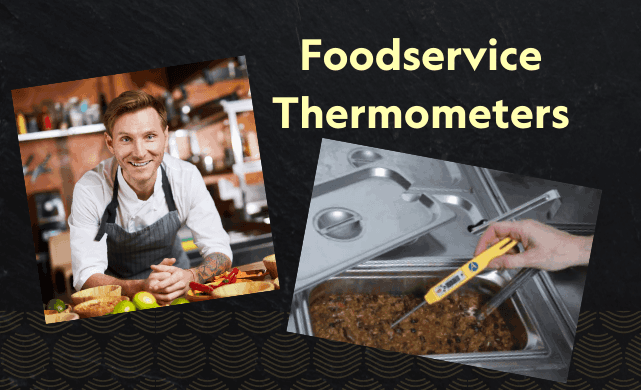One of the most crucial yet often neglected tools in the kitchen is the thermometer. Whether you're checking the temperature of food that's ready to serve, monitoring food stored in the fridge, or even assessing frozen goods, having a reliable thermometer is essential to ensure food safety and avoid any risk of foodborne illnesses. A thermometer is the only accurate way to measure food temperatures. In professional kitchens, you'll find a variety of thermometers, each designed for specific tasks. Let me break down some of the most common types and their uses: First up is the pocket thermometer. You'll often spot chefs wearing these in their apron pockets or attached to their sleeves. These compact devices are great for quickly checking the temperature of food during preparation or right before serving. Chefs have the option of using either a digital or dial version depending on their preference. Another handy tool is the waterproof digital thermometer. Many of these models are built to withstand splashes and spills, making them ideal for use around dishwashers to ensure the water reaches the necessary temperature for sanitizing dishes. Some restaurants also use dishwashing test strips to monitor the effectiveness of their washing cycles. These strips can be logged for health inspections. For those who need temporary temperature readings, T-Sticks Food Temperature Thermometers are perfect. They change color when they reach a predetermined temperature, allowing you to easily track if food has been cooked to the correct internal temperature. Available in green (140°F for water baths), black (160°F for ground meats, fish, pork, and eggs), and brown (170°F for reheating cooked foods). If you're looking to measure surface temperatures without inserting a probe, an infrared thermometer is the way to go. These are especially useful in the age of the pandemic, where temperature checks are common. In the kitchen, they can quickly check the temperature of food pans before buffets or ensure that items in the walk-in freezer are at a safe temperature. Environmental thermometers are equally important, particularly in storage areas. Refrigerator/freezer thermometers and those that also measure humidity help maintain food safety from storage to cooking to serving. Oven thermometers and hot holding thermometers further support this process.

Keywords: Foodservice Thermometers
Rubber Hose,Charge Air Hose,Ford Air Intake Hose,Valve Connection Pcv Hose
HE BEI HONGAN AUTOMOBILE AND MOTORCYCLE FITTINGS CO.,LTD , https://www.honganproduct.com




